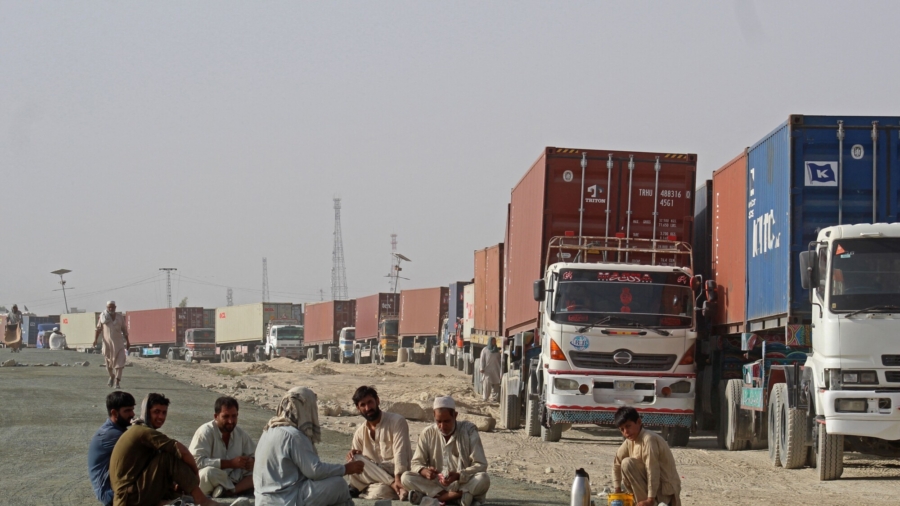ISLAMABAD—As international donors gather in Geneva on Monday to discuss humanitarian relief for Afghanistan under the rule of the Taliban terrorist group, neighbors China and Pakistan have already reached out with aid and discussions of future assistance.
The economy in the war-torn country is in crisis and a humanitarian crisis is looming, experts say.
Yet the United States and other Western nations are reluctant to provide the Taliban with funds until the radical Islamic terrorist movement provides assurances that it will uphold human rights, and in particular the rights of women.
The country’s roughly $10 billion in foreign assets, held overseas, are also frozen.
“The understandable purpose is to deny these funds to the de facto Taliban administration,” Deborah Lyons, the U.N. Secretary General’s special representative for Afghanistan, told the U.N. Security Council this week.
“The inevitable effect, however, will be a severe economic downturn that could throw many more millions into poverty and hunger, may generate a massive wave of refugees from Afghanistan, and indeed set Afghanistan back for generations.”
Another possible effect could be to drive Afghanistan closer to its neighbors and close allies Pakistan and China, who have already sent planeloads of supplies to Afghanistan. They have also signaled they are open to ramped-up engagement.
The Chinese regime announced last week it would send $31 million worth of food and health supplies to Afghanistan, among the first foreign aid pledges since the Taliban took power last month.
Pakistan last week sent supplies such as cooking oil and medicine to authorities in Kabul, while the country’s foreign minister called on the international community to provide assistance without conditions and to unfreeze Afghanistan’s assets.
Minerals and Terrorism
Pakistan has had deep ties with the Taliban terrorist group and has been accused of supporting the group as it battled the U.S.-backed government in Kabul for 20 years—charges denied by Islamabad.
China, with a strong alliance with Pakistan, has also been engaging with the Taliban. Some analysts said it was enticed by the country’s mineral wealth, including large reserves of lithium, a key component for electric vehicles.
The Chinese Communist Party (CCP) has also expressed concern about terrorism that could spill over from Afghanistan across its border, which it wants the Taliban to help contain.
Beyond humanitarian aid, one possibility is Afghanistan joining the China-Pakistan Economic Corridor (CPEC), a central part of the CCP’s Belt and Road Initiative (BRI), under which Beijing has pledged over $60 billion for infrastructure projects in Pakistan, much of it in the form of loans.
“The Taliban would welcome joining CPEC, China would also be very happy,” said Rustam Shah Mohmand, Pakistan’s former ambassador to Afghanistan.

The Chinese regime has not made any comment on the BRI but Foreign Minister Wang Yi has said Beijing is ready to actively discuss the resumption of China-Afghanistan freight trains and facilitate Afghanistan’s interaction with the outside world, especially its access to humanitarian supplies.
Pakistan’s foreign office and a Taliban spokesperson did not immediately respond to the request for comment.
Taliban, CCP Talk: Source
Taliban leaders in recent weeks have said they want good relations with the Chinese regime.
A senior Taliban source said discussions have taken place with China in Doha about possible investment opportunities. The Chinese regime is interested in mining in particular but any activity in the sector will be open to tender, the source said.
“The Taliban welcomes foreign investment that will benefit the country,” he said.
Two sources in Afghanistan and Pakistan familiar with the matter said China had been proactively encouraging Afghanistan to join CPEC for years but had been met with a non-committal response from the previous U.S.-backed government.
The Taliban, with a need for economic stimulus and international recognition, seems more keen.
“The best way forward and the immediately available alternative option for Afghanistan’s economic development is CPEC, which includes Pakistan and China,” said Mushahid Hussain Sayed, a Pakistani senator and former chairman of the China-Pakistan Institute.
“The new administration in Kabul would also be receptive to this and they are keen on it.”
For the Chinese regime, though, which already has mining interests in Afghanistan that have struggled to get off the ground, any further investment would come with risks attached, given the uncertain security situation in the country.
NTD staff contributed to this report


